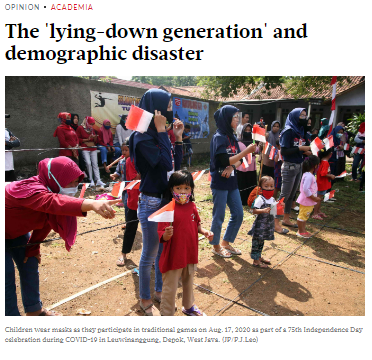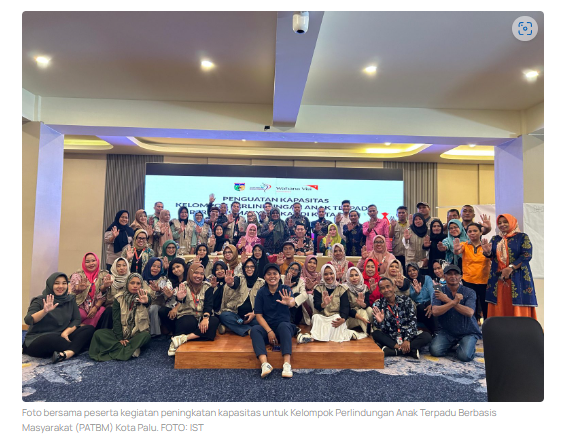Opinion: The 'lying-down Generation' and Demographic Disaster

For many years, people who spend a lot of time lying down have been referred to as generasi rebahan, or the “lying-down generation”. Ever since the COVID-19 pandemic struck three years ago, the phrase "lying down" has come to mean a lack of mobility among the younger generation. Due to the social distancing enforced to prevent the spread of COVID-19, people chose to do everything while lying down. As a consequence of the restrictions, in-person activities were substituted with internet activities. When tested alongside 57 other nations in 2022, the level of physical activity among Indonesian children and teenagers obtained the extremely poor grade of F (AHKI, 2022). Given that the pandemic affected the whole world, it cannot justify the low grade.
In fact, Indonesian children frequently engage in sedentary behavior as one of their main pastimes, even without a pandemic. If we do nothing to change our sedentary behavior, Indonesia will most likely have a large, physically unfit population of working age (15–64 years) in the future. The expected benefits of the demographic bonus are therefore in jeopardy. Long-term health is harmed by a lack of physical activity. People who don't exercise regularly face serious health risks from diabetes, high blood pressure, obesity and heart attacks (Health Ministry, 2023).
According to the “Obesity Fact Sheet” published in 2018 by the Health Ministry, 10.8 percent of Indonesian children aged 5-12 are obese and 18.8 percent are overweight. The same study discovered that 41 million toddlers worldwide are overweight or obese. Diabetes and other chronic disorders are more likely in young children who are obese. Of course, parents and other adults are entirely responsible for a toddler suffering obesity. Parents frequently become complacent and give their kids foods that make them obese, foods that ready to eat and contain a lot of sugar and artificial additives, while ignoring their health due to a misconception that fat children are adorable.
On top of parents' responsibility to educate their children about nutritious foods, kids who are at an age to make their own dietary choices, normally from 5 years until entering elementary school, can start learning about how to keep their bodies healthy. Children definitely need to be made aware about their habit of eating snacks that lack the nutrients their bodies need. The fact that parents no longer routinely monitor their children's health, like their own parents did while they were young, presents another barrier to the health development of elementary school-aged children.
The Posyandu (integrated health post) program is implemented through a School Health Unit (UKS), but regrettably, not all elementary schools have a UKS. Of the 100 elementary schools in East Nusa Tenggara that Wahana Visi Indonesia (WVI) assisted through its Build Our Kids' Success (BOKS) program in 2022-2023, only a few have an active UKS program. Youth Posyandu providing specialized treatments to adolescent kids are available, but this only indicates that health issues in elementary school students are not tracked well. Challenges facing big cities are more daunting due to many types of conveniences, such as online games and entertainment that incentivize youngsters to reduce physical activities.
In the past, children played stilts, jump rope, hide and seek, marbles and many other outdoor games. Today, these games have practically vanished. Almost all games known to children today are devicebased. Unfortunately, many parents nowadays allow their children to use gadgets from a very young age, preventing them from developing active and healthy habits. In the end, when these children grow older, they will regard physical activities as difficult and tiring.
Children's physical activities do not have to be competitive sports. However, they do not take the form of shopping at traditional markets, washing dishes or performing other household chores. Physical activities that cause them to sweat or pant are what children need. Moderate to intense exertion causes the body to sweat, the pulse and respiration rates to increase while you can still converse with each other. Cycling, running, jumping, throwing and other recreational sports such as traditional games are examples of moderate physical activities that children can participate in.
We initiated the BOKS program in 2021 to encourage children to engage in more physical activities and learn about nutritious foods, either in their schools or communities. The program aims to instill a habit of physical activity among elementary school-aged children by providing a safe and supportive learning and playing environment. In fact, the government's Healthy School program intends to foster children's long-term dedication to living healthily so they can grow and develop optimally and improve their academic performance. Sedentary behavior, if left unaddressed, will endanger children's health, increase the risk of noncommunicable diseases and create undesirable behaviors that will be difficult to reverse in adulthood. Parents, educators and other adults must work together to show children that moving and exercising are enjoyable activities. Children who play actively will not only gain health, but also a variety of skills that build character. Let's prevent the demographic bonus from turning into a demographic disaster.
Written by: Saskia Rosita Indasari, BOKS Team Leader
https://www.thejakartapost.com/opinion/2023/09/21/the-lying-down-generation-and-demographic-disaster.html



